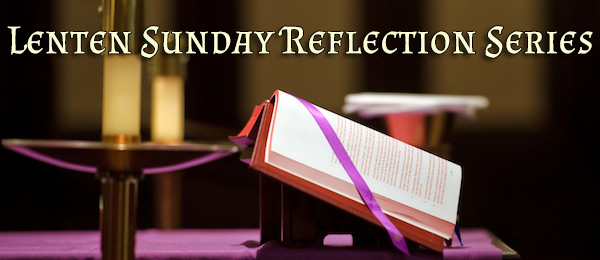Today’s Lenten reflection comes from the University of Notre Dame.
Palm Sunday Gospel Reading
Matthew 27:11-54
The very large crowd spread their cloaks on the road, while others cut branches from the trees and strewed them on the road. The crowds preceding him and those following kept crying out and saying: “Hosanna to the Son of David; blessed is the he who comes in the name of the Lord; hosanna in the highest.”
Then they came to a place called Golgotha, which means Place of the Skull. After they had crucified him, they divided his garments by casting lots; then they sat down and kept watch over him there. And they placed over his head the written charge against him: This is Jesus, the King of the Jews.
Gospel Reflection: People of Hope
By Father Sean McGraw, C.S.C. ’92, ‘00M.Div.
A few years ago a very large family in the Chicago area lost one of their teenage boys in a tragic accident while he was away on a spring break trip with friends. Hundreds of people gathered days later for the wake to mourn and support each other. The house was filled with sorrow, despair, and lots of tears as the family and friends gathered together to come to grips with this heart-wrenching loss.
As one of the aunts was departing, she overheard two of the cousins, both of whom have Down syndrome, conversing in an upbeat and joy-filled manner. They were speaking to each other about what a great night it had been and how glad they had been to be present. Slightly stunned, the aunt reluctantly asked the two what they meant and how they could be so upbeat at such a sad time. They looked back in surprise wondering how she did not get it. One of the cousins replied, “There was so much love here.” And the other chimed in, “I have never seen so many people hugging each other and telling each other how much they loved everyone.”
The aunt was taken aback for a moment, but then she recalled that these two cousins often saw what others did not see. Where others saw loss, pain, and sorrow, they saw healing, comfort, joy, and an abiding presence of love. Their innocence, purity, and simplicity allowed them to make the real connection that God was there even in moments of deep loss and apparent sorrow—and maybe especially there.
These beautiful cousins taught their aunt, and remind us as well, that God is present, working miracles in our lives, even at those times when we feel most broken or at a loss. God does not desert us. In fact, God gave us his only Son to give away his life for us, so that despite our weakness and sin, we would never be alone. When others doubted or misunderstood his call, especially at the end on the cross, Jesus remained faithful. And whenever we empty ourselves in small or big ways and give away our lives for others, we enter more fully into the mystery of the cross.
The Constitutions of the Congregation of Holy Cross remind us that we must be people of hope, for Christ the Lord has risen to die no more:
He has taken us into the mystery and the grace of this life that springs up from death. If we, like him, encounter and accept suffering in our lives, we will move without awkwardness among others who suffer. We must be people with hope to bring. There is no failure the Lord’s love cannot reverse, no humiliation he cannot exchange for blessing, no anger he cannot dissolve, no routine he cannot transfigure. All is swallowed up in victory. He has nothing but gifts to offer. It remains only for us to find how even the cross can be borne as a gift.
During this holiest of weeks, we are invited to ponder this great act of love, even—perhaps especially—in the apparently painful event of the cross, and to pray for the grace to accept it in gratitude.
Fr. Sean McGraw, C.S.C., is an Assistant Professor of Political Science. He co-founded the Alliance for Catholic Education with Fr. Tim Scully, C.S.C., in 1993, and is the chair of the ACE advisory board.
Reflection Prompts:
In what parts of our lives are we being called to see God’s saving love? Where are we encountering the cross right now? How might we be called to be faithful in this experience, as Christ was in his experience of the cross? How might this experience of suffering also be an opportunity for transformation?
Who are the people who, by their self-sacrifice and love, have revealed God’s saving presence in our lives?
How I am being called to be a person of hope—a person who, like these most insightful cousins, sees love and God’s presence where others do not?
Find more resources for Holy week here.

